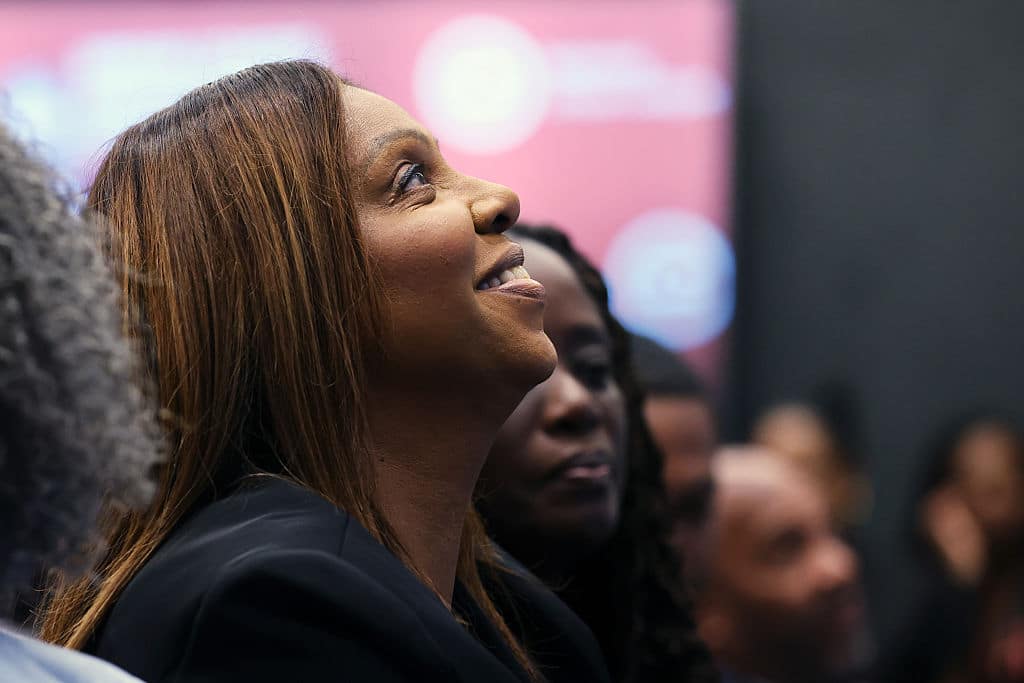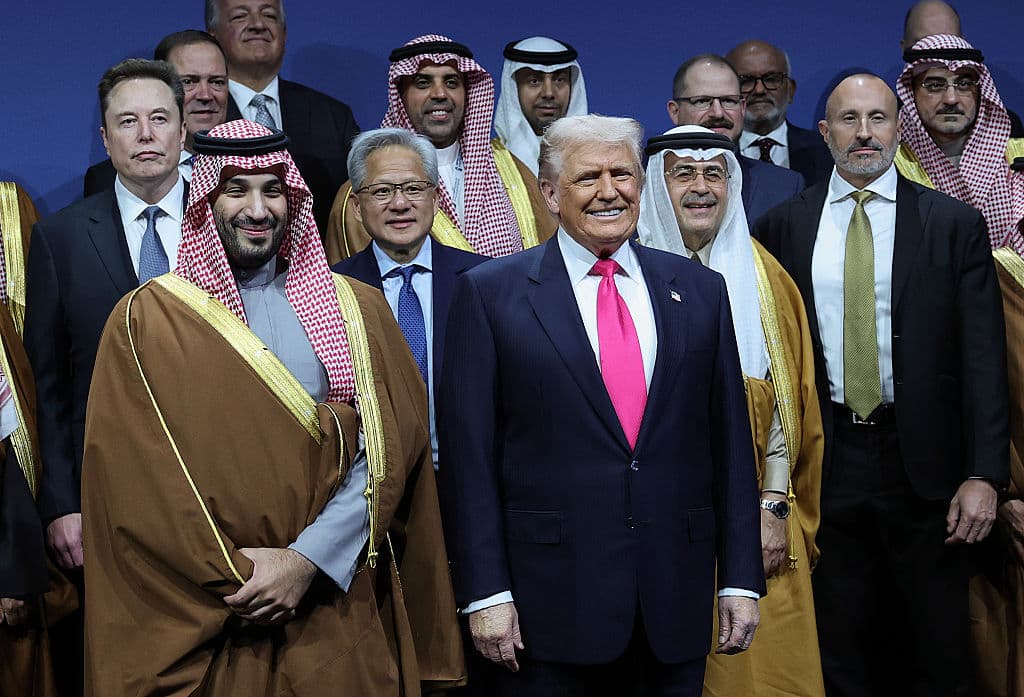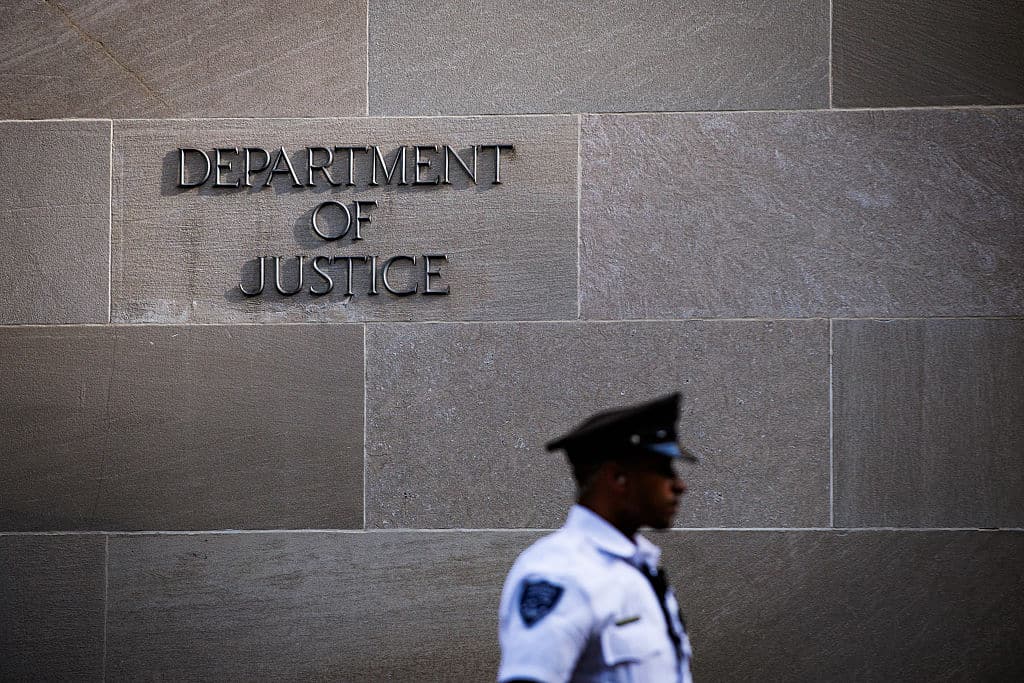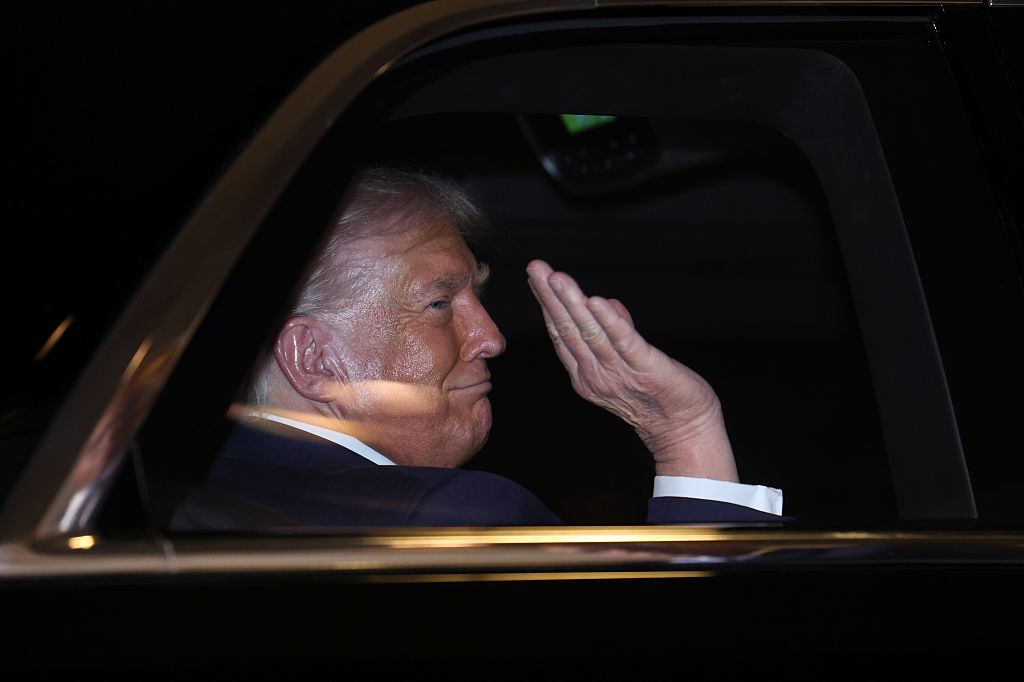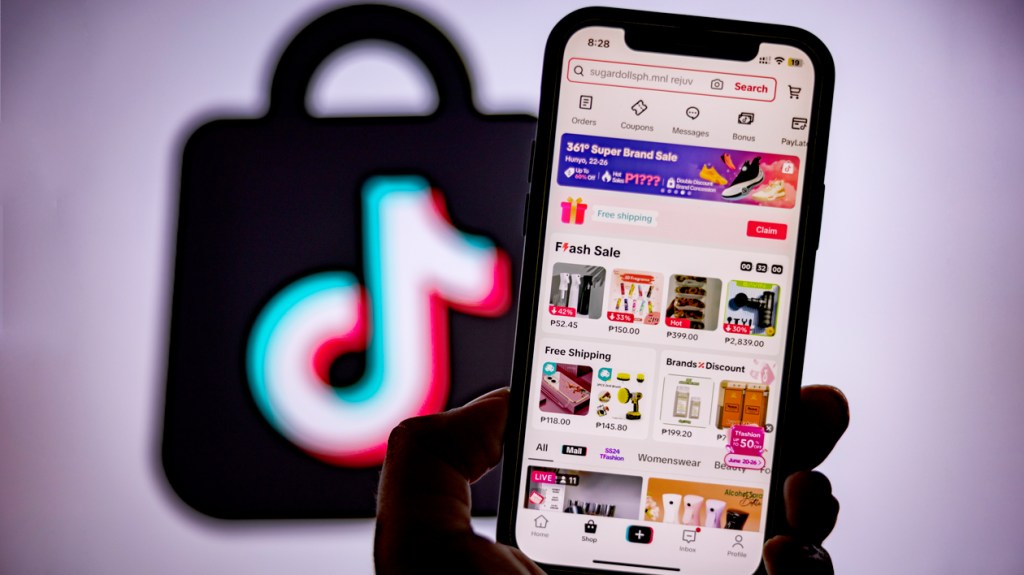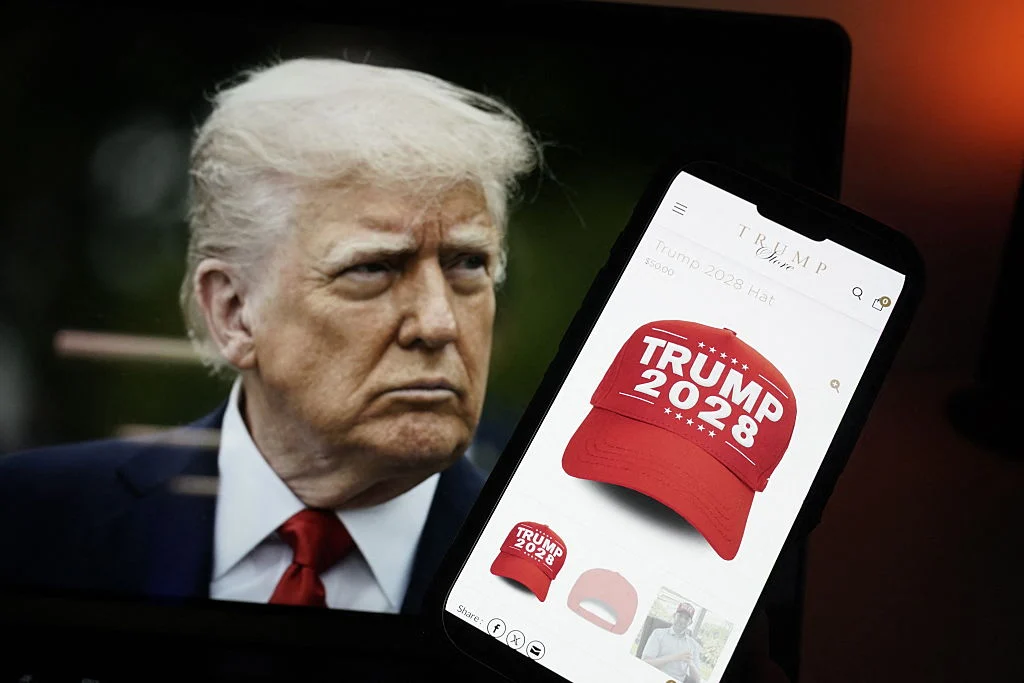Trump
Source: Spencer Platt / Getty
Efforts by President Donald Trump to use the judicial system against his perceived enemies took a serious hit, as a federal judge dismissed separate cases against former FBI Director James Comey and New York Attorney General Letitia James. United States District Court Judge Cameron McGowan Currie made the ruling on Monday (Nov. 24), citing that Lindsey Halligan, the interim prosecutor in the Eastern District of Virginia, was “unlawfully appointed.”
In her ruling, Judge Currie wrote that it was improper for the Trump administration to appoint two interim prosecutors in a row, relying ironically on a previous decision by District Court Judge Aileen Cannon to dismiss an indictment against Trump due to the appointment of Jack Smith as a special counsel.
Halligan, a former White House aide, was named interim prosecutor to replace Erik Siebert. Siebert vocalized that there wasn’t sufficient evidence to indict both Comey and James. Upon taking over in late September, Halligan rushed to indict both figures, despite having no background as a prosecutor.
Judge Currie only ruled on the procedural issues, leaving it open for another prosecutor to pursue. But she noted the effect it would have on the criminal justice system. “It would mean the government could send any private citizen off the street — attorney or not — into the grand jury room to secure an indictment so long as the attorney general gives her approval after the fact,” she wrote. “That cannot be the law.”The ruling makes it the fourth instance that an appointment of a loyalist by the Justice Department has been declared unlawful, according to the New York Times. This includes the installation of Alina Habba as interim head of the U.S. attorney’s office in New Jersey. Attorney General Pam Bondi responded, stating that the Justice Department planned to pursue “all available legal action, including an immediate appeal.”
Source: Win McNamee / Getty
On Thursday (November 20), White House Press Secretary Karoline Leavitt was questioned about President Donald Trump scolding Bloomberg New reporter Catherine Lucey when she asked him about the Jeffrey Epstein files last week while on Air Force One. “Quiet, piggy!” he replied to Lucey.“What did the president mean when he called the reporter piggy?”, a reporter asked Leavitt. She replied, “Look, the president is very frank and honest with everyone in this room…You have all experienced it yourself and I think it is one of the many reasons the American people reelected this president, because of his frankness. And he calls out fake news when he sees it. He gets frustrated with reporters when you lie about him, when you spread fake news about him and his administration.”
Leavitt continued, “The president being frank and open and honest to your faces, rather than hiding behind your backs, is, frankly, a lot more respectful than what you saw in the last administration.”With the last line, Leavitt appeared to suggest that former President Joe Biden’s administration wasn’t respectful of the press. But Trump’s comments to Lucey seems to be part of a growing pattern where he’s comfortable being rude to members of the press, especially if they’re women.Trump became upset with ABC News reporter Mary Bruce on Tuesday during an Oval Office meeting with Saudi Arabia’s Crown Prince Mohammad bin Salman. It was in response to her asking about the murder of journalist Jamal Khashoggi in 2018, with a followup question about the Epstein files.
In September, NBC News White House Correspondent Yamiche Alcindor asked Trump “Are you trying to go to war with Chicago?” as he was heading to New York City for the U.S. Open. He called her question “fake news”, and when Alcindor tried to follow up, he snapped “Be quiet, listen! You don’t listen! You never listen. That’s why you’re second-rate.”
Source: Samuel Corum / Getty
A federal judge overseeing the Justice Department’s case against former FBI Director James Comey called out the largest DOJ for a “disturbing pattern of profound investigative missteps” in the process of securing an indictment.
According to the Associated Press, Magistrate Judge William Fitzpatrick noted that the DOJ didn’t even provide defense lawyers with all the grand jury materials from the case.
“Those problems, wrote Judge Fitzpatrick, include ‘fundamental misstatements of the law’ by a prosecutor to the grand jury that indicted Comey in September, the use of potentially privileged communications during the investigation and unexplained irregularities in the transcript of the grand jury proceedings,” AP reports.
Love Hip-Hop Wired? Get more! Join the Hip-Hop Wired Newsletter
We care about your data. See our privacy policy.
“The Court recognizes that the relief sought by the defense is rarely granted,” Fitzpatrick wrote. “However, the record points to a disturbing pattern of profound investigative missteps, missteps that led an FBI agent and a prosecutor to potentially undermine the integrity of the grand jury proceeding.”
Judge Fitzpatrick’s 24-page opinion is a literal smackdown to the Justice Department’s actions leading up to the Comey indictment. The opinion points to how the DOJ’s rush to indict lead to procedural missteps, which gives the appearance that the independent arm of the law is working lockstep with President Donald Trump for “reasons separate and apart from the substance of the disputed allegations against Comey,” AP notes.
The Comey case and a separate prosecution of New York Attorney General Letitia James shows that the Justice Department is being weaponized to attack Trump’s political opponents. Both Comey and James filed several motions to dismiss these cases before the trials even began, claiming that the vindictive nature of the cases and the prosecutor who filed them, Lindsey Halligan, wasn’t even appointed properly.
Halligan apparently had no prior prosecutorial experience before being appointed as the interim U.S. attorney. Critics argue that making her the sole prosecutor for such high-stakes cases raises serious questions about competence and legitimacy and who may be pulling the strings behind the scene.
A different judge is expected to decide whether Halligan’s appointment can be challenged.
Source: Bernard Smalls / @PhotosByBeanz
Nicki Minaj is showing serious love for Donald Trump — again. She recently showed even more love for Donald Trump after he used one of her songs on a White House TikTok.
As per TMZ, Nicki Minaj was pretty geeked that Donald Trump’s Cabinet is leaning into her discography for a social media play. This week, the official White House account shared a video of Donald Trump and Melania Trump doing their signature offbeat jig to a tune that incorporates a mashup of Onika’s “Beez In The Trap.” The caption simply reads “The best to ever do it 🇺🇸.” As expected, the news of this administration tapping into this track specifically, with curses included, quickly went viral and landed on Nicki’s radar. She promptly commented on the post saying, “This is pretty incredible. Thank you.”
The “Super Freaky Girl” MC later took to X, formerly Twitter, to further thank Trump and Melania. “The President & First Lady of the UNITED STATES OF AMERICA!!!!!!!!!!!!!!!!!!!!!!!!!!! Barbz, idk which one of you uploaded this to the white house TikTok but just know unlimited backstage GAG CITY FOR LIFE Idk what timeline we’re on right now, I’m just goin w|the flow,” she wrote.
This is the second time in the last couple of weeks Nicki Minaj has shown gratitude to Donald Trump. On Oct. 31, she personally praised the POTUS on social media for his stance on Nigeria and deeming the country to be a concern due to violence against Christian believers. Unsurprisingly, this led to many questioning if Nicki Minaj is now siding with one of the most polarizing figures ever to hold the United States presidential seat. “@NICKIMINAJ is a MAGA y’all I’m in shock,” one user wrote. While another added, “MAGA Nicki is not on my bingo card.”
Donald Trump nor the White House have yet to respond Nicki Minaj directly.
Source: Pool / Getty
There used to be a time where journalism would hold powerful people accountable, unfortunately those days are long behind us as Time magazine has bent the knee to the Trump administration and released a new cover for its upcoming Nov. 10 issue featuring President Trump after the president was reportedly unhappy with the original image.
According to Deadline, Time unveiled the second version of the cover earlier this week centered around the reported peace deal between Gaza and Israel, that Israel violated almost as soon as the ink was dry. The original image was an upward photo that showed the president jowls looking X-rated, with the words “His Triumph.”
Trump hated this photo and took to social media to voice his displeasure.
“Time Magazine wrote a relatively good story about me, but the picture may be the Worst of All Time. They ‘disappeared’ my hair, and then had something floating on top of my head that looked like a floating crown, but an extremely small one. Really weird! I never liked taking pictures from underneath angles, but this is a super bad picture, and deserves to be called out. What are they doing, and why?”
Love Politics? Get more! Join the Hip-Hop Wired Newsletter
We care about your data. See our privacy policy.
The new photo shows Trump sitting at the Hayes desk with his hands clasped in front of his chin. The new caption reads, “Trump’s World.”
Time magazine and the president have a relationship. Since Dec. 2024, the president has appeared on the cover of the news outlet some 40 times. Trump is currently third in the race of Republican presidents who have owned the front cover trailing only Ronald Reagan and record holder and fellow disgraced president Richard Nixon.
Deadline points out that this cover count doesn’t include the fake covers hanging in at least five of his golf clubs that feature cover lines like “Trump is hitting it on all fronts … even TV!” “The existence of the bogus covers, reported by the Washington Post, prompted the magazine to ask Trump to remove them. Since then, several real covers currently hang in various locations inside his Mar-a-Lago residence. Time also named him the Person of the Year in 2016 and 2024,” Deadline reports.
Imagine moving into a rental home and demolishing part of it to build a ballroom. That’s exactly what President Trump did to the White House East Wing, Monday as he began the construction of his $200 million, 90,000-square-foot ballroom.
CNN staff witnessed an excavator destroying parts of the East Wing, including the roof and interior.
“Renderings released earlier by the White House showed that the ballroom, which the administration has said will be funded by Trump and other private donors, would be built over this area. Press secretary Karoline Leavitt said over the summer that the ‘state ballroom’ would occupy space housing the East Wing of the executive mansion, where first ladies have traditionally maintained offices,” CNN added in its report.
The project fulfills the president’s wish for an event space at the White House that would expand the building’s entertaining capacity and continue the president’s demands that the people’s house take on the same gaudy tackiness of his private clubs. So far, Trump’s efforts to make the White House resemble something Liberace would be proud of have included the ballroom, large flagpoles, the destruction of the Rose Garden with pavement, and excessive gold accents inside the Oval Office.
Love News? Get more! Join the Hip-Hop Wired Newsletter
We care about your data. See our privacy policy.
“I am pleased to announce that ground has been broken on the White House grounds to build the new, big, beautiful White House Ballroom,” Trump posted on social media Monday evening. “Completely separate from the White House itself, the East Wing is being fully modernized as part of this process, and will be more beautiful than ever when it is complete!”
Trump also acknowledged the destruction of the White House East Room during an event celebrating LSU’s baseball teams.
“You know, we’re building right behind us — we’re building a ballroom. They wanted a ballroom for 150 years, and I’m giving that honor to this wonderful place,” he said. “I didn’t know I’d be standing here right now, because right on the other side, you have a lot of construction going on, which you might hear periodically.”
CNN notes that the new ballroom will have enough gold to make Trinidad James jealous, including (Trinidad James voice) gold all in the crystal chandeliers, gold all in the gilded Corinthian columns, gold inlays all in the coffered ceiling inlays, and gold all in the floor lamps. Don’t believe him just watch.
—
Photo: Getty
President Donald Trump is set to sign an executive order this week extending the deadline for TikTok’s Chinese parent company to divest the popular video-sharing app, marking the third such extension. The move comes after a previous 75-day reprieve granted in April, which aimed to keep TikTok operational in the U.S. while a potential sale […]
Source: Anadolu / Getty
You can add the Proud Boys to the growing list of groups unhappy with the United States government. The far-right group has filed a $100 million dollar lawsuit against the administration.
As per Raw Story the organization filed a claim on Friday, June 6 claiming their civil rights had been violated. The submitted is related to the infamous Jan. 6 2021 insurrection that took place at the United States Capital. Four of their leaders Ethan Nordean, Joe Biggs, Enrique Tarrio, and Zachary Rehl were all convicted on seditious conspiracy charges for their participation in trying to block the certification of the 2020 election results. Fast forwarded to 2025, President Trump commuted all their sentences but the Proud Boys’ gripe extends beyond the pardon.
“What follows is a parade of horribles: egregious and systemic abuse of the legal system and the United States Constitution to punish and oppress political allies of President Trump, by any and all means necessary, legal, or illegal,” the lawsuit reads. “Through the use of evidence tampering, witness intimidation, violations of attorney-client privilege, and placing spies to report on trial strategy, the government got its fondest wish of imprisoning the J6 Defendants, the modern equivalent of placing one’s enemies’ heads on a spike outside the town wall as a warning to any who would think to challenge the status quo.” The document goes on to say that now that they are free they can bring “against their tormentors for violations of their Fourth, Fifth, and Sixth Amendment Rights.”
Branded as “proud western chauvinists,” the Proud Boys are opposed to “white guilt” and “political correctness.” According to The Anti-Defamation League they embrace anti-immigrant, Islamophobic and anti-LGBTQ+ ideologies. The Justice Department has yet to comment on the lawsuit.
HipHopWired Featured Video
Eddie Vedder paid tribute to Bruce Springsteen during Pearl Jam’s concert in Pittsburgh on Friday night (May 17), performing a solo acoustic rendition of “My City of Ruins” in what appeared to be a quiet but powerful response to Donald Trump’s recent public criticism of Springsteen.
Explore
See latest videos, charts and news
See latest videos, charts and news
Vedder did not reference Trump directly and did not mention Springsteen by name before performing the song. But the choice was likely intentional, as Springsteen has been performing the 2002 track during his tour alongside fiery speeches condemning what he describes as attacks on civil liberties by Trump and his allies.
Trending on Billboard
During the kickoff of his European tour on May 14, Springsteen told the audience, “In my home, the America I love, the America I’ve written about, and has been a beacon of hope and liberty for 250 years, is currently in the hands of a corrupt, incompetent, and treasonous administration.”
Trump responded on Truth Social on May 16, calling Springsteen “highly overrated,” “dumb as a rock,” and “a dried out prune of a rocker.” He also threatened to bar the musician from returning to the U.S. after his tour, writing, “Springsteen ought to keep his mouth shut until he gets back into the country. Then we’ll all see how it goes for him.”
Springsteen did not back down. “Things are happening right now that are altering the very nature of our country’s democracy, and they’re too important to ignore,” the rocker said to the crowd in a three-minute speech on Manchester’s Co-op Live stage on Saturday, as heard in a video posted by the L.A. Times.
“In my home, they’re persecuting people for their right to free speech and voicing their dissent. That’s happening now,” Springsteen said, echoing what he’d spoken about at his May 14 show. “In America, the richest men are taking satisfaction in abandoning the world’s poorest children to sickness and death. That’s happening now. In my country, they’re taking sadistic pleasure in the pain they inflict on loyal American workers.”
Springsteen continued, “They are removing residents off American streets without due process of law and deploying them to foreign detention centers as prisoners. That’s happening now…They have no concern or idea of what it means to be deeply American.”
HipHopWired Featured Video
Source: OLIVER CONTRERAS / Getty
As President Donald Trump’s second term in the White House has reached 100 days, one move has again made many concerned that he is looking to serve a third term despite the constitutional ban against it. On Thursday (April 25), his official “Trump Store” website boasted the red caps for sale with “TRUMP 2028” emblazoned in white on the front of them.“Make a statement with this Made in America Trump 2028 hat,” the product description on the site reads. Each hat, which the site purportedly says are made in the United States, costs $50 each. The shop is also selling T-shirts in navy blue and red with the slogan “Trump 2028 (Rewrite the Rules).” Those shirts are priced at $36. His son, Eric Trump, was shown wearing the hat in a post shared on X, formerly Twitter, by a group backing Trump’s ambitions for a third term. Republican Congresswoman Marjorie Taylor Greene also shared a photo of the hat on X, alongside another red, white, and blue hat that read “Gulf Of America.”
The hat is the latest sign that Trump is adamant about a third term in office. In an interview with NBC News, he said he was “not joking” about his intentions. “A lot of people want me to do it,” Trump said on the Sunday morning (April 20) phone call. “But, I mean, I basically tell them we have a long way to go, you know, it’s very early in the administration.” He also didn’t rule out Vice President JD Vance being tabbed to run for office and handing the presidency to Trump if he won. “That’s one method,” Trump conceded, adding “But, there are others, too.”The 22nd Amendment of the Consitution explicitly states that “No person shall be elected to the office of the President more than twice.” A change of that nature would require either a two-thirds vote of Congress or two-thirds of the states calling for a constitutional convention to submit changes. It then would call for three-quarters of the states to ratify the changes.While some Republicans have tried to pass these statements off as jokes, other GOP politicians have openly endorsed it. Tennessee Representative Andy Ogles even introduced a resolution calling for the extension of term limits so that Trump can remain in office. In a recent survey though, 53% of Republicans polled said the 78-year-old Trump should not run again.

 State Champ Radio
State Champ Radio 